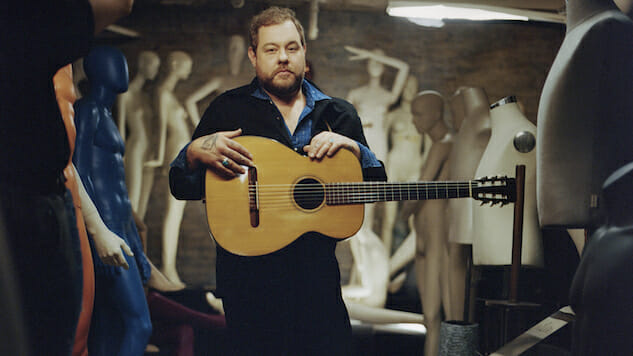Nathaniel Rateliff Keeps Hanging On
The Americana statesman goes solo again for his emotional new album And It's Still Alright
Photo by Danny Clinch
Nathaniel Rateliff & The Night Sweats are known for putting on a rowdy show. Frontman Rateliff’s calling card is his ragged, booming voice, which can be heard throughout the band’s three previously released LPs: a self-titled 2015 debut (which followed a wave of high-energy rock/soul releases from the likes of St. Paul & the Broken Bones and Lake Street Dive), 2016’s snappy A Little Something More From… and, most recently, 2018’s thoughtful Tearing At The Seams. The songs on these releases are very often restless, unrestrained and ruthlessly catchy. Just listen to the unceasing clapping and humming on “S.O.B.,” one of the more humorous tracks on that 2015 debut, and one of the band’s most popular songs ever. It’s peak Night Sweats.
The softer tunes on Rateliff’s new solo release, And It’s Still Alright (out Friday on Stax Records), may sound like a bit of a left turn, harkening back to his beginnings as a touring singer/songwriter (back when Paste hailed him The Best of What’s Next). This is a purposeful shift, as Rateliff told us: “For years before the Night Sweats I toured around as a singer/songwriter, and so that sort of writing style I really enjoy and am really familiar with. But I want it to be a slight departure from those days as well, and just look at it as a slightly different way of approaching the writing.”
What began as a piece on the downfall of a relationship became something even more meaningful after Rateliff’s longtime friend and producer Richard Swift, who was known for collaborations with The Shins and The Black Keys, as well as his own work as a singer/songwriter, passed away in the summer of 2018. Rateliff was planning to make what would eventually become And It’s Still Alright with Swift. The songs took a more somber turn thereafter, but they’re not devoid of hope. It’s quite the opposite, actually: That search for joy and meaning is evident in the title itself. “And It’s Still Alright.” It’s a rather comforting phrase.
Rateliff decided to record much of the album in Swift’s Oregon studio, even in his absence, and polish it off in Rateliff’s own home outside of Denver, Colo. And It’s Still Alright is tagged a solo record, but in reality it was made with a village: Night Sweats drummer Patrick Meese and Beach House drummer James Barone, who both engineered and mixed the record, are just a few of the folks who worked on this release.
The album is ultimately about finding pockets of joy and light in grief and darkness. On the title track, Rateliff sings, “They say you learn a lot out there, how to scorch and burn / Only have to bury your friends, then you’ll find it gets worse.” But the final verse drives home the album’s central message: “Your idle hands are all that stands / From your time in the dark / But it’s still alright.” We spoke with Rateliff on the phone to talk about the meaning behind some of the songs, his memories of Swift and finding inspiration from Harry Nilsson, among other places. This conversation has been edited for length.
Paste: What prompted you to write and release this record, and to do it on your own?
Nathaniel Rateliff: As we were making the last Night Sweats record, I had a lot of songs that I was sharing with Richard Swift, and so this is really a record that we had planned on doing together. We were going through a lot of the same things before he had passed. Part of my process of dealing with stuff is writing about it, and I just felt the need to put these songs out and do something slightly different than making a third Night Sweats record. [I] just didn’t feel the songs themselves would really be appropriate for what I want the Night Sweats to continue to be.
What was it like recording the album at Richard Swift’s studio?
Rateliff: Last March is when we first started making the record. Patrick Meese, who plays drums in the Night Sweats, and James Barone, who plays in Beach House—we’d all worked with Richard, and since I had intended to make the record originally with Richard, honoring that idea and my commitment to him, we wanted to start it back at his studio. His intentions originally were to do what he had done on the four Damien Jurado records he made, where I just bring him songs and I was gonna let him do whatever he wanted to do, just have him guide me through his production process. But his studio definitely has a real sound. If you listen through Richard’s body of work, and even the people he worked with, you can really hear the room. I really liked the sound of that room, so we went there, just started tracks and then finished everything else at my house outside of Denver.
This release has more of a solitary folk flow than something the Night Sweats might make. Can you walk me through how you got there sonically?
-

-

-

-

-

-

-

-

-

-

-

-

-

-

-

-

-

-

-

-

-

-

-

-

-

-

-

-

-

-

-

-

-

-

-

-

-

-

-

-








































